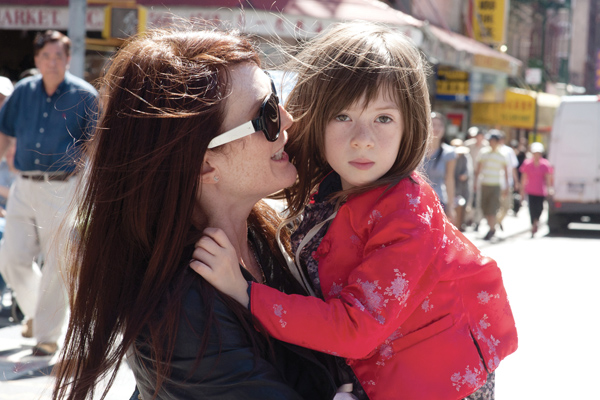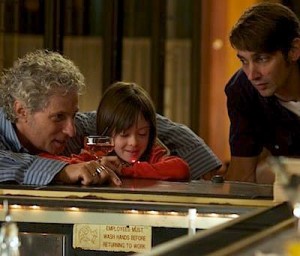
By Andrea Gronvall andreagronvall@aol.com
An interview with WHAT MAISIE KNEW’s Scott McGehee and David Siegel

What Maisie Knew, the latest film from the directing team of Scott McGehee and David Siegel (Suture, The Deep End, Bee Season), is about an endearing 6-year-old girl caught between her warring parents. Very loosely based on the novel by Henry James, the movie has a thoroughly contemporary look and feel, from its setting in downtown Manhattan, to its detailed portrait of a trendy, narcissistic “creative” couple’s breakup. Julianne Moore plays Maisie’s mother, Susanna, a fading rock diva who’s unwilling to relinquish either the limelight or her footloose lifestyle, even as her art dealer husband Beale (Steve Coogan) moves out, taking the child’s nanny Margo (Joanna Vanderham) with him. Alexander Skarsgard costars as Lincoln, a bartender who catches Susanna on the rebound. These four actors are so strong, and the plot twists so satisfying, they’d be reason enough to watch, but the film’s revelation is Onata Aprile as Maisie.
In her first feature role, Aprile gives a performance of such grace, confidence, and naturalism that she calls to mind other great child actors’ movie debuts, including those of Hayley Mills in J. Lee Thompson’s Tiger Bay (1959) and Tatum O’Neal in Peter Bogdanovich’s Paper Moon (1973). You’d have to have a heart of obsidian not to fall for this little girl in a big, big way. Maisie is the calm at the center of the storm, a playful innocent at the mercy of capricious adults, yet she seems at times more mature than they. The film shimmers and pulsates around her. When New Yorkers McGehee and Siegel flew in recently to bang the drum, they couldn’t stop talking about her. Millennium Entertainment is orchestrating the platform release of this arthouse gem, which is likely to wind up on numerous Top Ten lists at year’s end. But don’t wait until then; find What Maisie Knew at a theatre near you, and see it now.
ANDREA GRONVALL: This is my first time setting eyes on you, because I’ve never seen you interviewed. So, forgive me, but who is who?
SCOTT McGEHEE: I’m the smart one.
DAVID SIEGEL: I’m the handsome one.
AG: Okay, thanks—good to have that settled! Let’s start with the script, because you usually do your own writing. Was the tone of the film pretty much already on the page when you first read the screenplay by Nancy Doyne and Carroll Cartwright? What, if any, significant changes did you make?
DS: The screenwriters crafted a lovely script; we were attracted to its lightness of touch. We were most attracted to telling a story from a child’s point of view. But the original script was quite different from our movie. We admire it very much, but everything wasn’t all on the page. We were changing things as we went along, because once you start working with the camera, you find out what in the script works and what doesn’t.
SM: And so much of that we owe to Onata Aprile, who plays Maisie. We fell in love with her on day one. Her spirit is just so lovely; every day she would show up, just happy to be there. We had as great an experience filming with her as we did shooting The Deep End in Lake Tahoe.
DS: Onata is like Tilda Swinton and the lake rolled into one. I would wake up each morning knowing, “I get to go to work with Onata today!”
AG: I’ve read your comments elsewhere about how from the very start Alexander Skarsgård bonded with Onata off-camera, resulting in their appealing on-screen chemistry. What approach did your other actors take to working with her?
DS: I think Julianne Moore’s approach to Onata was to make sure she was safe, because Julianne herself has kids, and as Maisie’s mom she had to scream a lot. So, she would sometimes say, “Here we’re going to play pretend. Let’s pretend that….” And Onata, who is very bright, picked up right away on the “pretending” aspect, and ran with it.
SM: The casting of Steve Coogan as Maisie’s father was part of our strategy of preserving some comic moments. He was fantastic playing this really dark character, but he also brought a humorous edge to Beale.
SM: None of our actors were into any “super Method” mode. Between takes the set was very relaxed, so it was easy to slip into acting, and then out. That seemed to come quite naturally to Onata. She has a great attention span, and is there to do what you need her to do, but when you call “Cut!,” she’s off exploring. Everything fascinated her.
DS: Everything! From the dollies, to the lights, to the cameras. [When we were in development] at first we thought of hiring a 9-year-old actor to play Maisie. But then we began reading that after age six, kids become selfconscious. It was the right move to have a 6-year-old playing her own age.
AG: Let’s talk a little about the look of your film. How early on did you begin consulting with your production designer, Kelly McGehee, and your cinematographer, Giles Nuttgens—for instance, on your color choices? The film’s warm color palette reminds me of those bold, saturated colors found in many children’s paintings. But it’s never harsh, even when Maisie’s parents are behaving harshly.
DS: As you know, Kelly is Scott’s sister; we’ve been working together since we started making shorts, and so she was on board early. And this is our third time around with Giles [who also shot The Deep End and Bee Season]. Color palette is one of the first things—maybe the first thing—we always discuss when planning a movie.
The second thing we discuss is the quality of light. We knew Giles could get us the kind of luminosity we wanted. We were impressed by the effects cinematographer Emmanuel Lubezki achieved in Alfonso Cuarón’s Children Of Men. Giles has a similar sensitivity, and got us that intense but spectral quality of light we were looking for.
AG: It appeared to me that a number of the close-ups of the adult characters seemed to have been shot from below. Was this deliberate, to reflect the point of view of someone as small as Maisie?
SM: You don’t always know in advance. You spend a lot of time looking [through the camera], and then discussing what a close-up will mean.
DS: To some extent, the angles of the close-ups did show Maisie’s POV, but often they were for technical reasons, like matching the characters’ eye lines in any given scene.
AG: How much did it cost to make What Maisie Knew? What’s on screen looks so rich, but I suspect you achieved that without a big budget.
DS: I think you might have more money in you bag than we had to work with. Maybe I shouldn’t say, but it was $5,000,000. We enjoy working with constraints, but that’s a tight budget for shooting for 35 days, on location and with a union crew.
SM: The challenge was to make that five million stretch across as many days as possible—which becomes a bigger challenge when you consider that our lead actor is a child who is in almost every scene, and there are child labor laws that limit the hours that kids can work. Not to mention that they sometimes get tired.
DS: We had to go out to the beach twice to shoot the nighttime scene that’s toward the end of the picture, because on the first night Onata fell asleep, and that was that.
AG: What cameras did you use?
SM: An Arri film camera, shooting Super 35mm, using Cooke lenses and a 2:35:1 aspect ratio—as you noticed, we designed for the wide-screen format. You might think that was an expensive way to go, but after we had priced out various digital shooting options, the way we ultimately chose was comparable in cost. Our objective was always to conserve as much money as possible so that our actors had as much time as we could give them to deliver their best performances.















Hello,
I am a friend of Scott’s father, Bill. The last time I saw Scott was at his father’s wake. We all miss Bill. Bill and I taught at Edison High School in Huntington Beach, CA. I would like to have a way to contact Scott with a very interesting story about another fellow teacher, Jon Pawson. If you could forward this request, it would be very nice of you.
Thank you, Mike Wilson